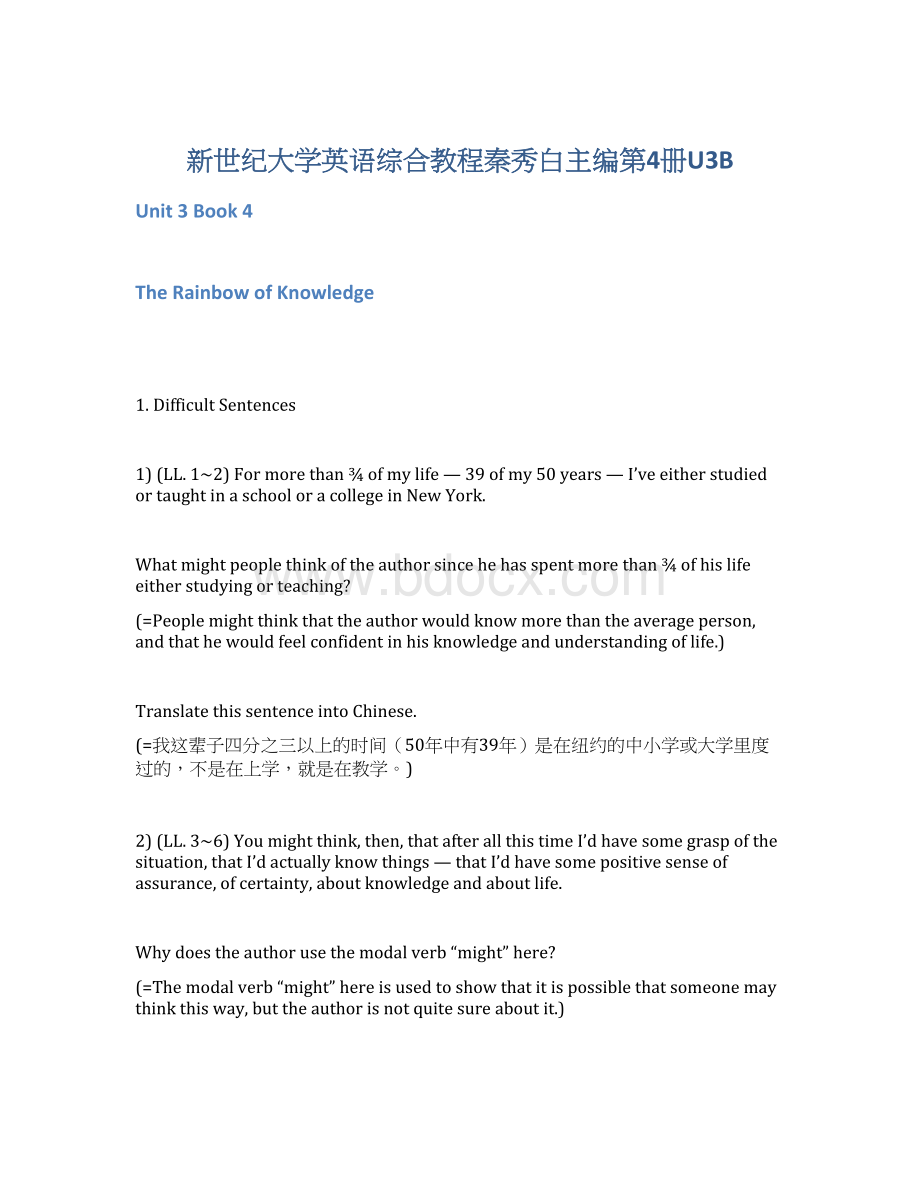新世纪大学英语综合教程秦秀白主编第4册U3B.docx
《新世纪大学英语综合教程秦秀白主编第4册U3B.docx》由会员分享,可在线阅读,更多相关《新世纪大学英语综合教程秦秀白主编第4册U3B.docx(21页珍藏版)》请在冰豆网上搜索。

新世纪大学英语综合教程秦秀白主编第4册U3B
Unit3Book4
TheRainbowofKnowledge
1.DifficultSentences
1)(LL.1~2)Formorethan¾ofmylife—39ofmy50years—I’veeitherstudiedortaughtinaschooloracollegeinNewYork.
Whatmightpeoplethinkoftheauthorsincehehasspentmorethan¾ofhislifeeitherstudyingorteaching?
(=Peoplemightthinkthattheauthorwouldknowmorethantheaverageperson,andthathewouldfeelconfidentinhisknowledgeandunderstandingoflife.)
TranslatethissentenceintoChinese.
(=我这辈子四分之三以上的时间(50年中有39年)是在纽约的中小学或大学里度过的,不是在上学,就是在教学。
)
2)(LL.3~6)Youmightthink,then,thatafterallthistimeI’dhavesomegraspofthesituation,thatI’dactuallyknowthings—thatI’dhavesomepositivesenseofassurance,ofcertainty,aboutknowledgeandaboutlife.
Whydoestheauthorusethemodalverb“might”here?
(=Themodalverb“might”hereisusedtoshowthatitispossiblethatsomeonemaythinkthisway,buttheauthorisnotquitesureaboutit.)
Howdoyouunderstandthepart“I’dhavesomepositivesenseofassurance,ofcertainty,aboutknowledgeandaboutlife”?
(=I’dhavefullconfidenceintermsofunderstandingknowledgeandlife.)
3)(LL.8~9)TosaythatthemoreIknow,themoreIknowIdon’tknowis,ofcourse,contradictory.
Whatdoestheauthorthinkofthestatement“themoreIknow,themoreIknowIdon’tknow”?
(=Hethinksitisaself-contradictorystatement—aparadox.)
Haveyoueverfelt“themoreIknow,themoreIknowIdon’tknow”?
Pleaseciteyourpersonalexperiencestoillustrateyourpoint.
(=Open-ended.)
4)(LL.19~22)Asitgrows,sodoesitscircumference.Andifthatgrowingblacknessrepresentsknowledge,thenasitgrows,sodoestheawarenessofwhatremainsunknown.
Asone’sknowledgegrows,whatwillhappentohimaccordingtotheauthor?
(=Accordingtotheauthor,asone’sknowledgegrows,hisawarenessofwhathestilldoesn’tknowincreases,too.Inotherwords,themoreheknows,themoreheknowshedoesn’tknow.)
TranslatethispartintoChinese.
(=随着它的扩大,它的周缘也跟着扩大。
如果那个正在增大的黑色部分代表你的知识的话,在知识增长的同时,你会意识到自己有许多不知道的东西。
)
5)(LL.30~32)Likewise,whenIluckedintoanopportunitytoteachfilmanalysis,Ifoundmyselfdazzledatthesheernumberofbooksdevotedtothesubject.
Howdidtheauthorfeelatthattime?
(=Hefeltsurprised.)
Whydidhehavethatfeeling?
(=Becausethereweresomanybookspublishedonthesubjectoffilmanalysis.)
6)(LL.36~37)Butyouquicklyfindthatyourreading,ratherthanansweringquestions,onlycreatesmoreofthem.
Whatdoesreadingoftenleadtoaccordingtotheauthor?
(=Accordingtotheauthor,readingoftenleadstomorequestions,ratherthananswerstothequestionsthatonehascomeacross.)
Doyoubelievethattryingtoanswerquestionsinvolvesmorereading?
Why?
(=Open-ended.)
7)(LL.52~53)Forme,however,it’sjusttheopposite.Writingdoesn’tclosethingsoff—itopensthingsup.
Howtoexplainthetwoexpressions“close…off”and“open…up”?
(=“Close…off”meanstoseparatesomethingorsomeplacefromtheareaarounditsothatpeoplecannotgothereoruseit.“Open…up”meanstomakepossiblethedevelopmentofsomething.)
Whatisthesignificanceofwritingaccordingtotheauthor?
(=Accordingtotheauthor,writingleadshimtoabettergraspofwhathereads.Writingisnottheconclusionofwhatheknows,butareflectionofwhathetriestounderstand,whichmayleadtomorequestionsonthesubjecthewritesabout.)
8)(LL.54~55)Foralongtime,I,asawriter,wasparalyzedbythisparadox—themoreIknow,themoreIknowIdon’tknow.
Paraphrasethepart“I,…,wasparalyzedbytheparadox…”.
(=…thecontradictorystatementmademefeeluncertainandconfused…)
Whydoestheauthorsaythatforalongtimehewas“paralyzed”bytheparadox:
“themoreIknow,themoreIknowIdon’tknow”?
(=Foralongtime,theauthorfeltconfusedwiththeself-contradictorystatement“themoreIknow,themoreIknowIdon’tknow.”Hewasnotsurewhetherheshouldwriteornot.Andevenifhedidwrite,hewasuncertainwhetherhewasqualifiedtodoso.Healwaysfelthehadtoknowmorefirst.)
9)(LL.62~64)Ithinkofmyworknotasarticlesorascolumnsbutasessays—awordfromFrench,meaning“totry”.
Howistheword“essay”differentfrom“article”or“column”?
(=Theword“essay”comesfromFrench,meaning“totry”.)
Whydoestheauthorregardthearticlesandcolumnshehasproducedas“essays”?
(=Bycallinghisarticlesandcolumns“essays”,theauthoremphasizesthat,forhim,theprocessofwritingismerelyaprocessofTRYINGtoknowmoreortoacquiremoreknowledge.Inotherwords,hewritesinordertofindoutthetruthaboutsomethingratherthansimplyshowingtothepublicwhathealreadyknows.)
10)(LL.78~